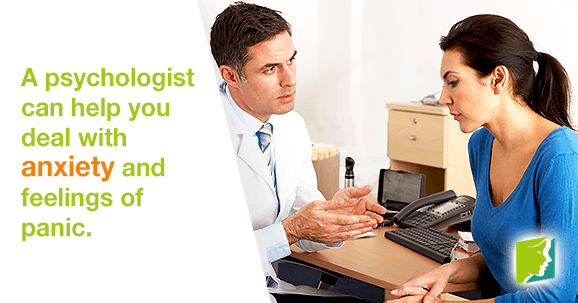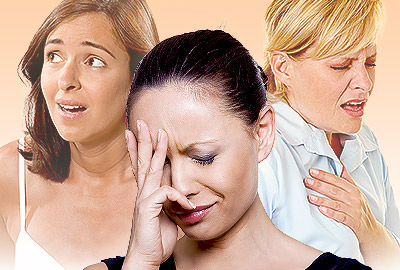Anxiety is common during menopause, often because of the many changes taking place in a woman's body. As estrogen levels decline, neurotransmitters for relaxation (e.g., endorphins and gamma-aminobutyric acid) decrease as well, while levels of the stress hormone cortisol increase. This causes an imbalance that can lead to more worrying, obsessing, and panicking. The stressed mindset will have you seeking out options, although the best routes to take may be unclear. Learn which remedy is best for you to restore inner peace in a lasting and healthy way.
Meditation
This is one of the most effective ways to reclaim emotional stability. It takes the most effort and discipline, but it is a profound way to revolutionize your perspective on life. Each day, give your brain time to decompress and release unnecessary concerns and fears by sitting down, closing your eyes, and deepening your breath.
Ambient music helps calm the mind, and is abundantly available on the internet. Start with 15 minutes and add time as you feel inspired to. If you are having trouble alone, seek support via digital guided sessions or meditation circles.
Yoga
There is a reason why this art of movement is becoming increasingly popular. This series of postures helps you develop strength, balance, and flexibility of not only the body, but of the mind as well.
The special sequences incorporate deep breathing and focus, which releases stress from your shoulders, hips, and forehead and increases your gamma-aminobutyric acid (GABA) levels. This is why practitioners end a session feeling so rejuvenated. Many yoga studios offer the first session free, so seek out your favorite one with ease and downward dog your way into relaxation.
Herbal Supplements
Sometimes you just need a bit of botanical assistance to reach a deeper state of relaxation. Anxiety treatments, like herbal supplements have been used for millennia, so individuals sought relief from the plant kingdom with great success. The benefits are felt to this day across the globe and are prescribed by herbalists and doctors. Some of the most common herbal supplements are:
• Phytoestrogenic supplements. They are primarily consumed in soy foods, these are widely used as alternatives to hormonal therapies.
• Hormone-regulating supplements. These are one of the easiest and safest way you can balance your hormones.
Also, herbs for relaxation and deep sleep are valerian from Europe, chamomile from ancient Egypt, and passionflower from the United States. Find high quality, pure herbs in tea or supplemental form from a trusted source.
Therapy Sessions
Talking with a counselor or psychologist can be deeply therapeutic. Such professionals have been trained to help their patients deal with anxiety and feelings of panic on their own terms. When you talk to your counselor, who will listen to you with an open mind, you can release your worries and work together to find solutions.
Medications
Antidepressants are often prescribed to stressed individuals by their doctors or psychiatrists and have been found to relieve anxiety-related issues in the short term. However, these medications may cause side effects in some people, so it is important that patients report any symptoms they experience to their doctors, so the prescription can be adjusted accordingly and anxiety treated efficiently.
If you feel overcome with anxiety, you should consider the most healing options for relief. Although yoga and meditation may take some dedication, they can help you come to a greater internal balance. Herbal supplements are also an easy way to peacefully ease your day, and talk therapy and medications are just another possibility. Everyone's body responds differently, so look for the treatment that best suits you and your particular needs.
Sources
- Dr Phil. (2014). Supplements for Menopausal and Hormonal Symptoms. Retrieved August 8, 2014, from http://www.drphil.com/articles/article/214
- Department of Food Science and Nutrition. University of Minnesota. (2003). Phytoestrogen supplement use by women. Retrieved August 8, 2014, from http://www.ncbi.nlm.nih.gov/pubmed/12851275
- HerbaZest. (2014). Valerian. Retrieved May 2, 2014, from http://www.herbazest.com/medicinal_plants/valerian
- National Institute of Mental Health. (n.d.). Anxiety Disorders. Retrieved May 2, 2014, from http://www.nimh.nih.gov/health/topics/anxiety-disorders/index.shtml
- Tice JA1, Ettinger B, Ensrud K, Wallace R, Blackwell T, and Cummings SR.(2003). Phytoestrogen supplements for the treatment of hot flashes: the Isoflavone Clover Extract (ICE) Study: a randomized controlled trial. Retrieved August 8, 2014, from http://www.ncbi.nlm.nih.gov/pubmed/12851275
- University of Maryland Medical Center. (2013). German chamomile. Retrieved May 2, 2014, from https://umm.edu/health/medical/altmed/herb/german-chamomile
- University of Maryland Medical Center. (2011). Passionflower. Retrieved May 2, 2014, from https://umm.edu/health/medical/altmed/herb/passionflower




